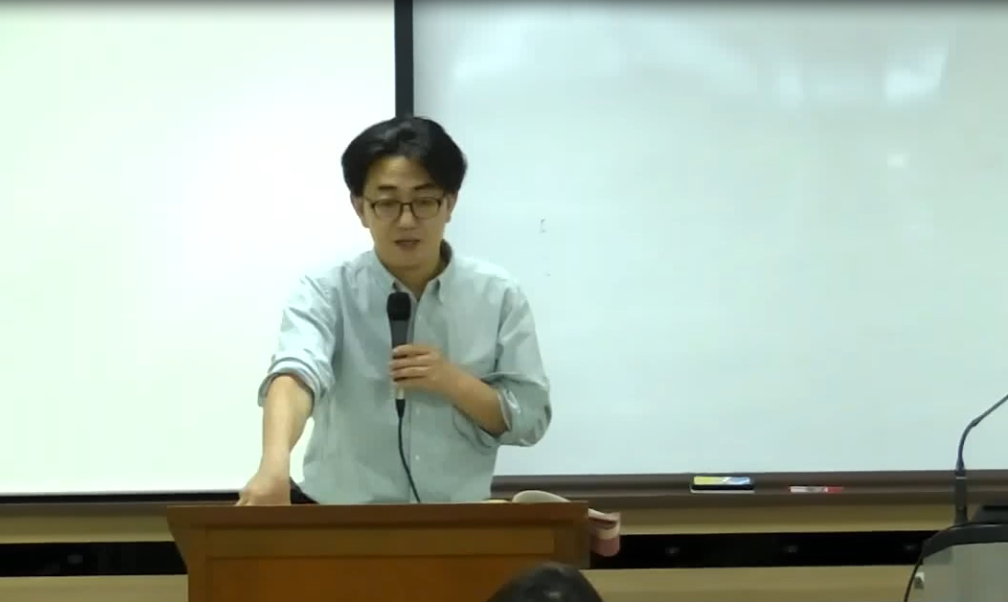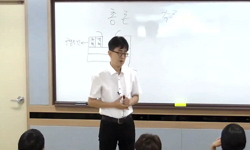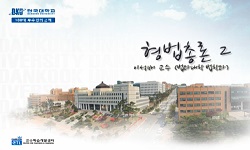Sejong, widely being referred as "Sejong the Great", would probably be a typical example of ideal leader of a nation. His accomplishment surpasses one`s expectation, across field of arts, sciences, law, military defense and diplomacy. Moreover he has ...
http://chineseinput.net/에서 pinyin(병음)방식으로 중국어를 변환할 수 있습니다.
변환된 중국어를 복사하여 사용하시면 됩니다.
- 中文 을 입력하시려면 zhongwen을 입력하시고 space를누르시면됩니다.
- 北京 을 입력하시려면 beijing을 입력하시고 space를 누르시면 됩니다.
https://www.riss.kr/link?id=A76544834
- 저자
- 발행기관
- 학술지명
- 권호사항
-
발행연도
2009
-
작성언어
-
-
주제어
세종 ; Sejong ; 정조 ; Jeongjo ; 형법 ; Criminal Law ; 사가독서 ; Sagadokseo ; 집현전 ; Jiphyeonjeon ; 규장각 ; Gyujanggak
-
KDC
360.05
-
등재정보
KCI등재후보
-
자료형태
학술저널
-
수록면
1-39(39쪽)
-
KCI 피인용횟수
7
- 제공처
- 소장기관
-
0
상세조회 -
0
다운로드
부가정보
다국어 초록 (Multilingual Abstract)
Sejong, widely being referred as "Sejong the Great", would probably be a typical example of ideal leader of a nation. His accomplishment surpasses one`s expectation, across field of arts, sciences, law, military defense and diplomacy. Moreover he has been highly regarded for his devotion and dedication to his people. Currently at this point, as almost a decade has passed since we entered the new millenium, we may question ourselves the possibility of encountering a leader like Sejong once again in this contemporary, highly industrialized society. If Sejong could be described as the one who had set the fundamental criteria for Chosun dynasty, what are the contents and conditions of those criteria that we may learn from? In order to find answer to such question, we should first examine Sejong`s mentality, ability and attitudes that would have operated as the precondition to his achievements. This article is aimed at examining those factors, especially focusing on Sejong`s devotion to the pursuit of knowledge. Every deed done by a human being is, indeed a human consequence. What I meant by human in the latter context is one`s very nature. In other words, one`s deed that takes form of external action is, in a sense, merely an expression of one`s internal nature. When it comes down to a matter of genuine leadership and thoughts, political rhetorics or techniques thereby cease to be the real issue. Sejong`s leadership as well as his thoughts in criminal law would likewise be, an expression of his human nature or humanity, after all. As a matter of fact, Sejong was a leader who had been utterly devoted to reading. Historical archives demonstrate that he had never ceased reading day and night. As the old proverb goes, he was the one chosen to be a wise king(`擇賢`). Moreover, he went onto establishing an official institute, where he would gather the wise men (`集賢`) to pursue knowledge, namely the Jiphyeonjeon. In addition, it is noteworthy that Sejong was the very first figure in korean history, who brought in the system of academic sabbatical year. Sagadokseo(賜 暇讀書) opportunities were being granted by the king, literally to encourage scholars to concentrate on reading and writing in quiet places like temples or countrysides, without their wages being cut-off. In comparison to Jeongjo, who had also been renowned for his devotion to studies, Sejong had a very different style, in terms of pursuing studies as a king. While Jeongjo was more of a speaker, who enjoys debates and teaching, always trying to draw others from the front, Sejong, on the other hand, could be described as more of a listener, who prefers discussion, trying rather to give supports from behind than from the front. As we may perceive from the Annals of King Sejong, he frequently gives instructions as to report to me after searching for references in old documents. It indicates that whenever he confronted moments of making important decisions, he referred to wise ideas of wise men from the past. This indicates us why devotion to the pursuit of knowledge is crucial virtue that every respectable leaders would, and should be armed with.
참고문헌 (Reference)
1 서범봉, "조선시대 사가독서제의 교육적 성격" 안암교육학회 9 (9): 5-30, 2003
2 성철, "자기를 바로봅시다" 장경각 2003
3 박병련, "세종조의 정치엘리트 양성과 인사운용의 특성" 6 (6): 2006
4 이종우, "세종조의 불교 정책" 한국종교학회 통권 (통권): 159-185, 2008
5 정윤재, "세종의 정치리더십 형성과정 연구" 한국/동양정치사상사학회 6 (6): 5-25, 2007
6 박현모, "세종의 수성(守成) 리더쉽"
7 김종명, "세종의 불교신앙과 훈민정음 창제" 한국/동양정치사상사학회 6 (6): 51-68, 2007
8 안재순, "세종대왕의 윤리사상" (12) : 1998
9 박현모, "세종과 정조의 리더쉽 스타일 비교" , (17) : 2007
10 이한우, "세종-조선의 표준을 세우다" 해냄출판사 2006
1 서범봉, "조선시대 사가독서제의 교육적 성격" 안암교육학회 9 (9): 5-30, 2003
2 성철, "자기를 바로봅시다" 장경각 2003
3 박병련, "세종조의 정치엘리트 양성과 인사운용의 특성" 6 (6): 2006
4 이종우, "세종조의 불교 정책" 한국종교학회 통권 (통권): 159-185, 2008
5 정윤재, "세종의 정치리더십 형성과정 연구" 한국/동양정치사상사학회 6 (6): 5-25, 2007
6 박현모, "세종의 수성(守成) 리더쉽"
7 김종명, "세종의 불교신앙과 훈민정음 창제" 한국/동양정치사상사학회 6 (6): 51-68, 2007
8 안재순, "세종대왕의 윤리사상" (12) : 1998
9 박현모, "세종과 정조의 리더쉽 스타일 비교" , (17) : 2007
10 이한우, "세종-조선의 표준을 세우다" 해냄출판사 2006
11 김중권, "성종조의 사가독서에 관한 연구" 14 : 1997
12 성철, "백일법문(상)" 장경각 1992
13 "국사편찬위원회, 조선왕조실록"
14 박현모, "‘성주(聖主)’와 ‘독부(獨夫)’ 사이: 척불(斥佛)논쟁과 정치가 세종의 고뇌" 한국정치사상학회 11 (11): 39-61, 2005
동일학술지(권/호) 다른 논문
-
외국인 보호 및 강제퇴거절차와 구제절차에 대한 공법적 고찰
- 고려대학교 법학연구원
- 하명호 ( Myeong Ho Ha )
- 2009
- KCI등재후보
-
- 고려대학교 법학연구원
- 이준일 ( Zoon Il Yi )
- 2009
- KCI등재후보
-
최근 독일행정법의 변화와 시사점 -유럽화, 민영화, 규제완화를 중심으로
- 고려대학교 법학연구원
- 문병효 ( Prof. Dr. Iur. Moon Byoung Hyo )
- 2009
- KCI등재후보
-
국무총리행정심판위원회와 시·도행정 심판위원회의 통합 논의에 관한 고찰
- 고려대학교 법학연구원
- 김연태 ( Yeon Tae Kim )
- 2009
- KCI등재후보
분석정보
인용정보 인용지수 설명보기
학술지 이력
| 연월일 | 이력구분 | 이력상세 | 등재구분 |
|---|---|---|---|
| 2026 | 평가예정 | 재인증평가 신청대상 (재인증) | |
| 2020-01-01 | 평가 | 등재학술지 유지 (재인증) |  |
| 2017-01-01 | 평가 | 등재학술지 유지 (계속평가) |  |
| 2013-01-01 | 평가 | 등재학술지 유지 (등재유지) |  |
| 2010-06-25 | 학술지명변경 | 외국어명 : 미등록 -> Korea Law Review |  |
| 2010-01-01 | 평가 | 등재학술지 선정 (등재후보2차) |  |
| 2009-01-01 | 평가 | 등재후보 1차 PASS (등재후보1차) |  |
| 2008-01-01 | 평가 | 등재후보 1차 FAIL (등재후보1차) |  |
| 2006-01-01 | 평가 | 등재후보학술지 선정 (신규평가) |  |
학술지 인용정보
| 기준연도 | WOS-KCI 통합IF(2년) | KCIF(2년) | KCIF(3년) |
|---|---|---|---|
| 2016 | 1.42 | 1.42 | 1.11 |
| KCIF(4년) | KCIF(5년) | 중심성지수(3년) | 즉시성지수 |
| 1.14 | 1.05 | 1.166 | 0.89 |





 KCI
KCI KISS
KISS







